Marriage, Kinship, and Family Systems in Human Societies: An Analysis
VerifiedAdded on 2022/08/25
|10
|2717
|17
Essay
AI Summary
This essay delves into the critical role of marriage systems, kinship, and family structures in human societies, with a specific focus on the Canadian context. It begins by establishing the family as a fundamental social unit, exploring various family types such as nuclear, single-parent, extended, and blended families, while highlighting the anthropological perspective on these structures. The essay then transitions to the institution of marriage, defining its universal presence and the diverse forms it takes, including traditional and modern perspectives, and addressing the emergence of homosexual marriages. Furthermore, it examines concepts like bride service and bride wealth. It also discusses kinship as a vital social construct, exploring its relationship with language and its role in organizing human relationships. Finally, the essay acknowledges the challenges faced by married couples, including rising divorce rates, and emphasizes the importance of marriage counseling and government support for strong family structures in Canada.
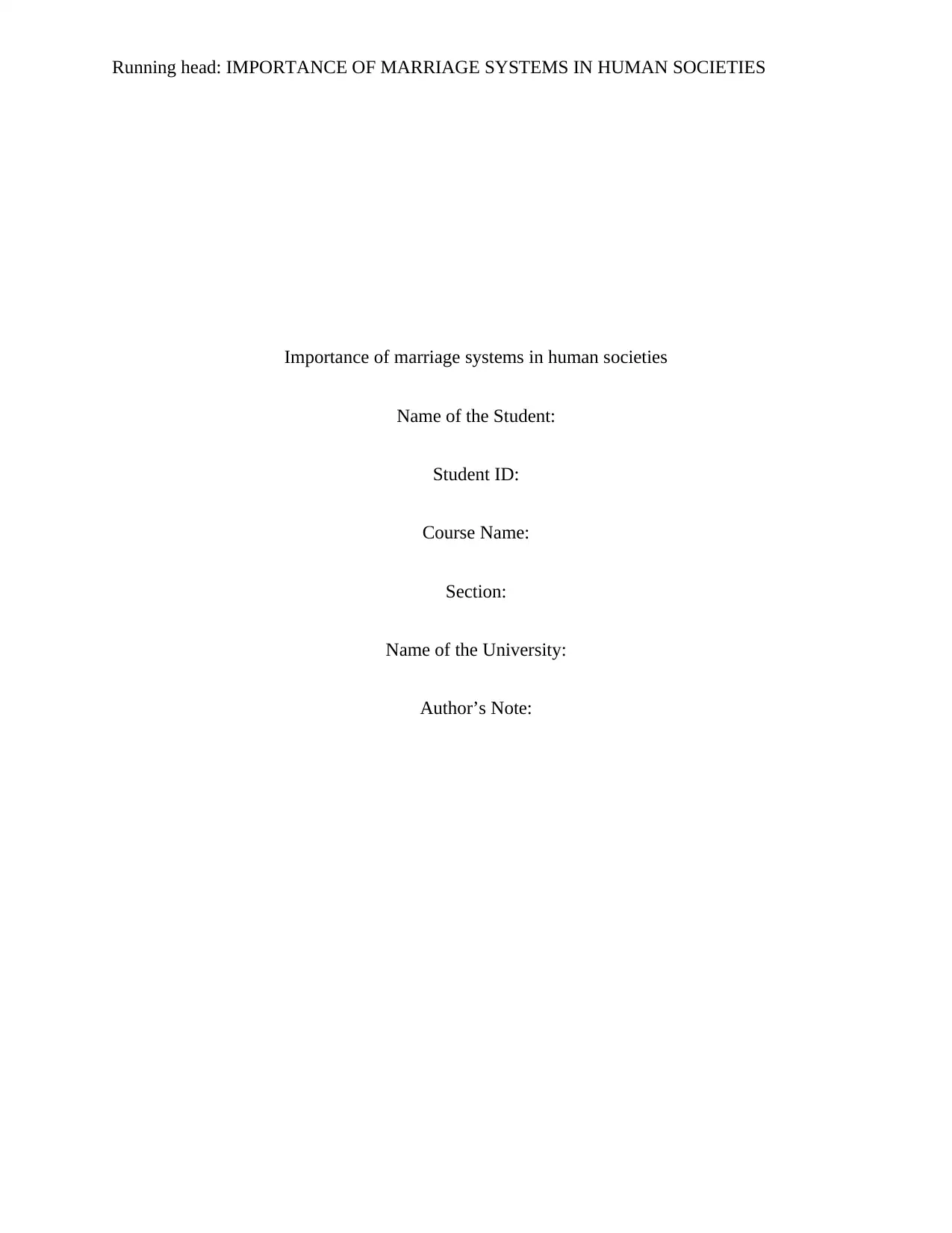
Running head: IMPORTANCE OF MARRIAGE SYSTEMS IN HUMAN SOCIETIES
Importance of marriage systems in human societies
Name of the Student:
Student ID:
Course Name:
Section:
Name of the University:
Author’s Note:
Importance of marriage systems in human societies
Name of the Student:
Student ID:
Course Name:
Section:
Name of the University:
Author’s Note:
Paraphrase This Document
Need a fresh take? Get an instant paraphrase of this document with our AI Paraphraser
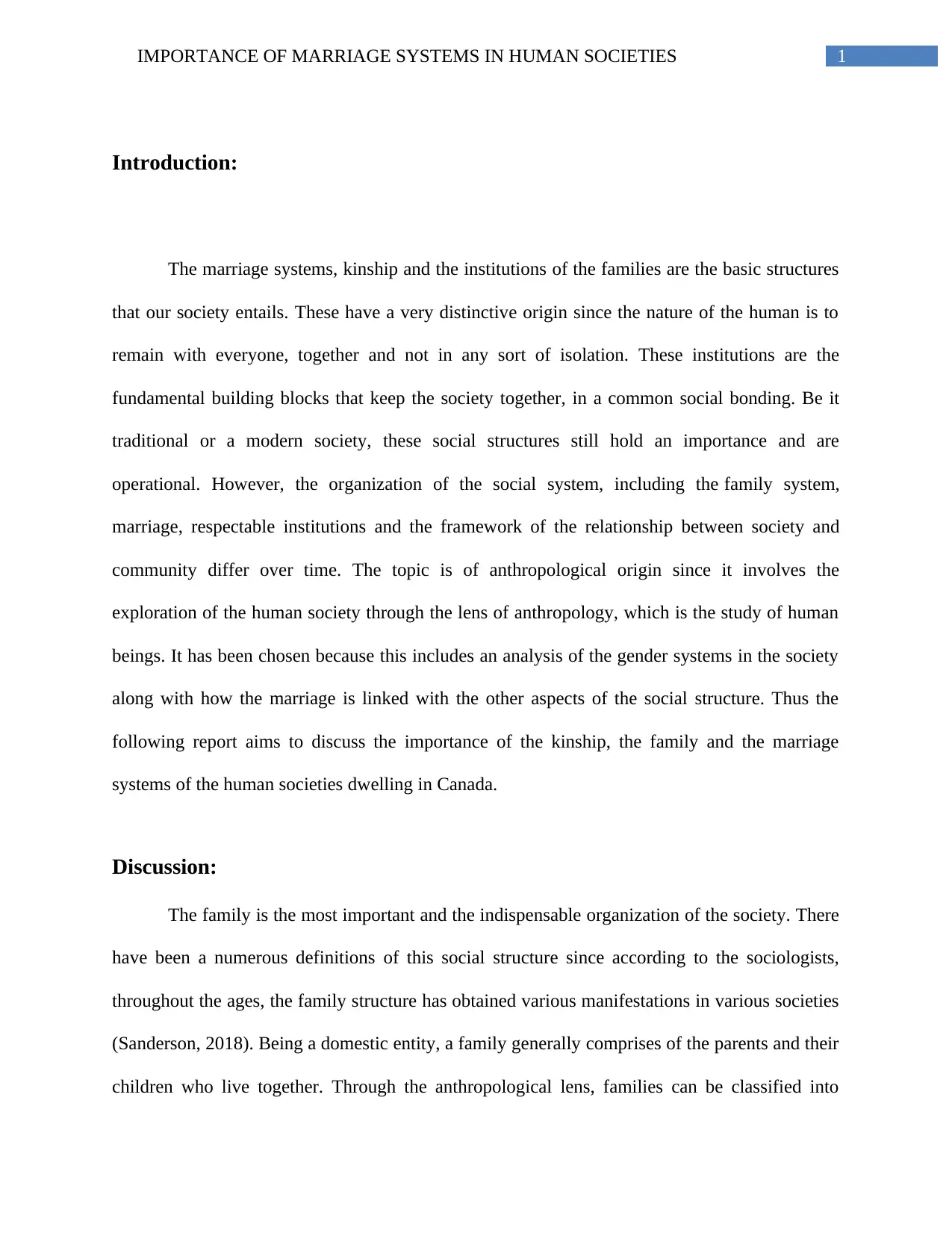
1IMPORTANCE OF MARRIAGE SYSTEMS IN HUMAN SOCIETIES
Introduction:
The marriage systems, kinship and the institutions of the families are the basic structures
that our society entails. These have a very distinctive origin since the nature of the human is to
remain with everyone, together and not in any sort of isolation. These institutions are the
fundamental building blocks that keep the society together, in a common social bonding. Be it
traditional or a modern society, these social structures still hold an importance and are
operational. However, the organization of the social system, including the family system,
marriage, respectable institutions and the framework of the relationship between society and
community differ over time. The topic is of anthropological origin since it involves the
exploration of the human society through the lens of anthropology, which is the study of human
beings. It has been chosen because this includes an analysis of the gender systems in the society
along with how the marriage is linked with the other aspects of the social structure. Thus the
following report aims to discuss the importance of the kinship, the family and the marriage
systems of the human societies dwelling in Canada.
Discussion:
The family is the most important and the indispensable organization of the society. There
have been a numerous definitions of this social structure since according to the sociologists,
throughout the ages, the family structure has obtained various manifestations in various societies
(Sanderson, 2018). Being a domestic entity, a family generally comprises of the parents and their
children who live together. Through the anthropological lens, families can be classified into
Introduction:
The marriage systems, kinship and the institutions of the families are the basic structures
that our society entails. These have a very distinctive origin since the nature of the human is to
remain with everyone, together and not in any sort of isolation. These institutions are the
fundamental building blocks that keep the society together, in a common social bonding. Be it
traditional or a modern society, these social structures still hold an importance and are
operational. However, the organization of the social system, including the family system,
marriage, respectable institutions and the framework of the relationship between society and
community differ over time. The topic is of anthropological origin since it involves the
exploration of the human society through the lens of anthropology, which is the study of human
beings. It has been chosen because this includes an analysis of the gender systems in the society
along with how the marriage is linked with the other aspects of the social structure. Thus the
following report aims to discuss the importance of the kinship, the family and the marriage
systems of the human societies dwelling in Canada.
Discussion:
The family is the most important and the indispensable organization of the society. There
have been a numerous definitions of this social structure since according to the sociologists,
throughout the ages, the family structure has obtained various manifestations in various societies
(Sanderson, 2018). Being a domestic entity, a family generally comprises of the parents and their
children who live together. Through the anthropological lens, families can be classified into
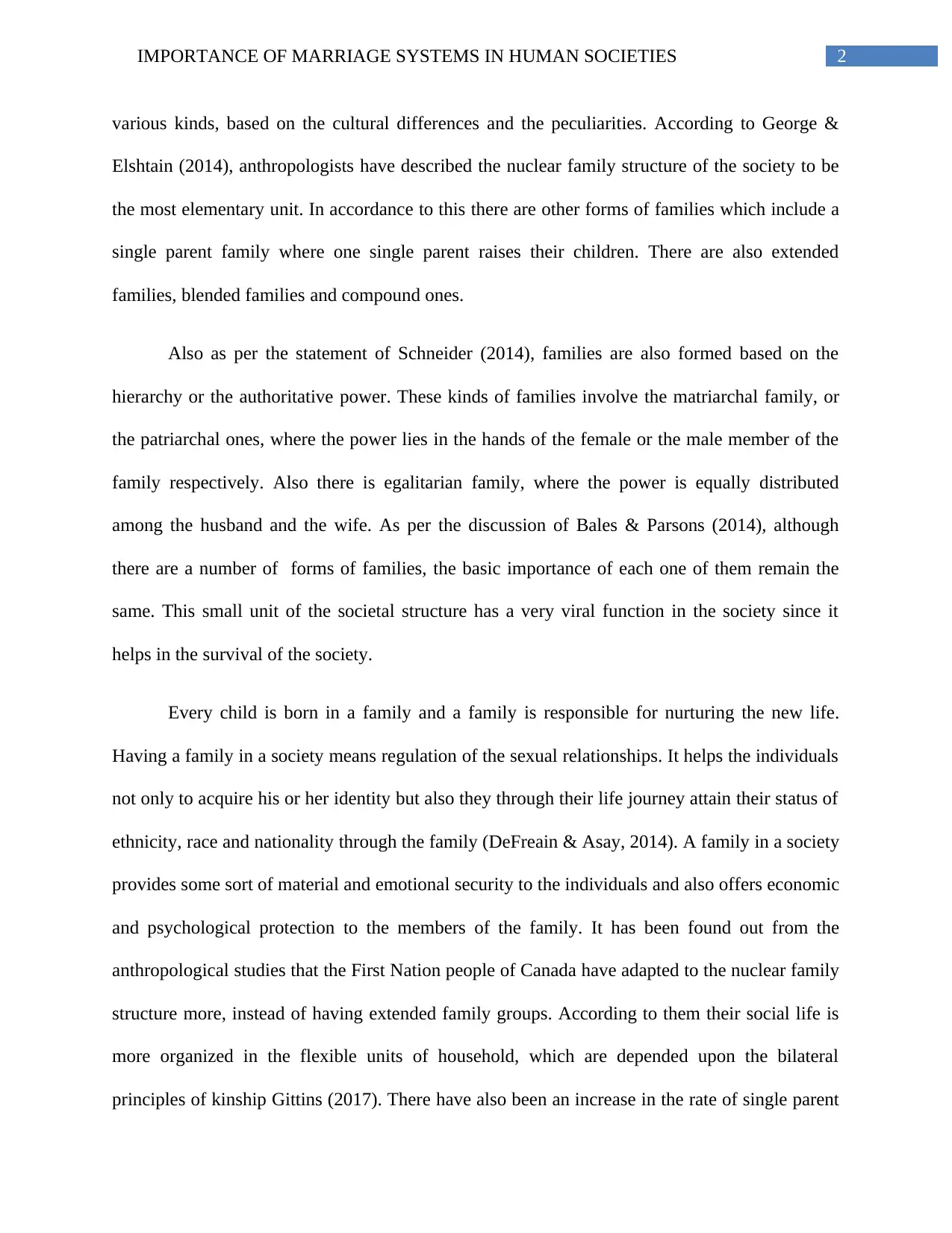
2IMPORTANCE OF MARRIAGE SYSTEMS IN HUMAN SOCIETIES
various kinds, based on the cultural differences and the peculiarities. According to George &
Elshtain (2014), anthropologists have described the nuclear family structure of the society to be
the most elementary unit. In accordance to this there are other forms of families which include a
single parent family where one single parent raises their children. There are also extended
families, blended families and compound ones.
Also as per the statement of Schneider (2014), families are also formed based on the
hierarchy or the authoritative power. These kinds of families involve the matriarchal family, or
the patriarchal ones, where the power lies in the hands of the female or the male member of the
family respectively. Also there is egalitarian family, where the power is equally distributed
among the husband and the wife. As per the discussion of Bales & Parsons (2014), although
there are a number of forms of families, the basic importance of each one of them remain the
same. This small unit of the societal structure has a very viral function in the society since it
helps in the survival of the society.
Every child is born in a family and a family is responsible for nurturing the new life.
Having a family in a society means regulation of the sexual relationships. It helps the individuals
not only to acquire his or her identity but also they through their life journey attain their status of
ethnicity, race and nationality through the family (DeFreain & Asay, 2014). A family in a society
provides some sort of material and emotional security to the individuals and also offers economic
and psychological protection to the members of the family. It has been found out from the
anthropological studies that the First Nation people of Canada have adapted to the nuclear family
structure more, instead of having extended family groups. According to them their social life is
more organized in the flexible units of household, which are depended upon the bilateral
principles of kinship Gittins (2017). There have also been an increase in the rate of single parent
various kinds, based on the cultural differences and the peculiarities. According to George &
Elshtain (2014), anthropologists have described the nuclear family structure of the society to be
the most elementary unit. In accordance to this there are other forms of families which include a
single parent family where one single parent raises their children. There are also extended
families, blended families and compound ones.
Also as per the statement of Schneider (2014), families are also formed based on the
hierarchy or the authoritative power. These kinds of families involve the matriarchal family, or
the patriarchal ones, where the power lies in the hands of the female or the male member of the
family respectively. Also there is egalitarian family, where the power is equally distributed
among the husband and the wife. As per the discussion of Bales & Parsons (2014), although
there are a number of forms of families, the basic importance of each one of them remain the
same. This small unit of the societal structure has a very viral function in the society since it
helps in the survival of the society.
Every child is born in a family and a family is responsible for nurturing the new life.
Having a family in a society means regulation of the sexual relationships. It helps the individuals
not only to acquire his or her identity but also they through their life journey attain their status of
ethnicity, race and nationality through the family (DeFreain & Asay, 2014). A family in a society
provides some sort of material and emotional security to the individuals and also offers economic
and psychological protection to the members of the family. It has been found out from the
anthropological studies that the First Nation people of Canada have adapted to the nuclear family
structure more, instead of having extended family groups. According to them their social life is
more organized in the flexible units of household, which are depended upon the bilateral
principles of kinship Gittins (2017). There have also been an increase in the rate of single parent
⊘ This is a preview!⊘
Do you want full access?
Subscribe today to unlock all pages.

Trusted by 1+ million students worldwide
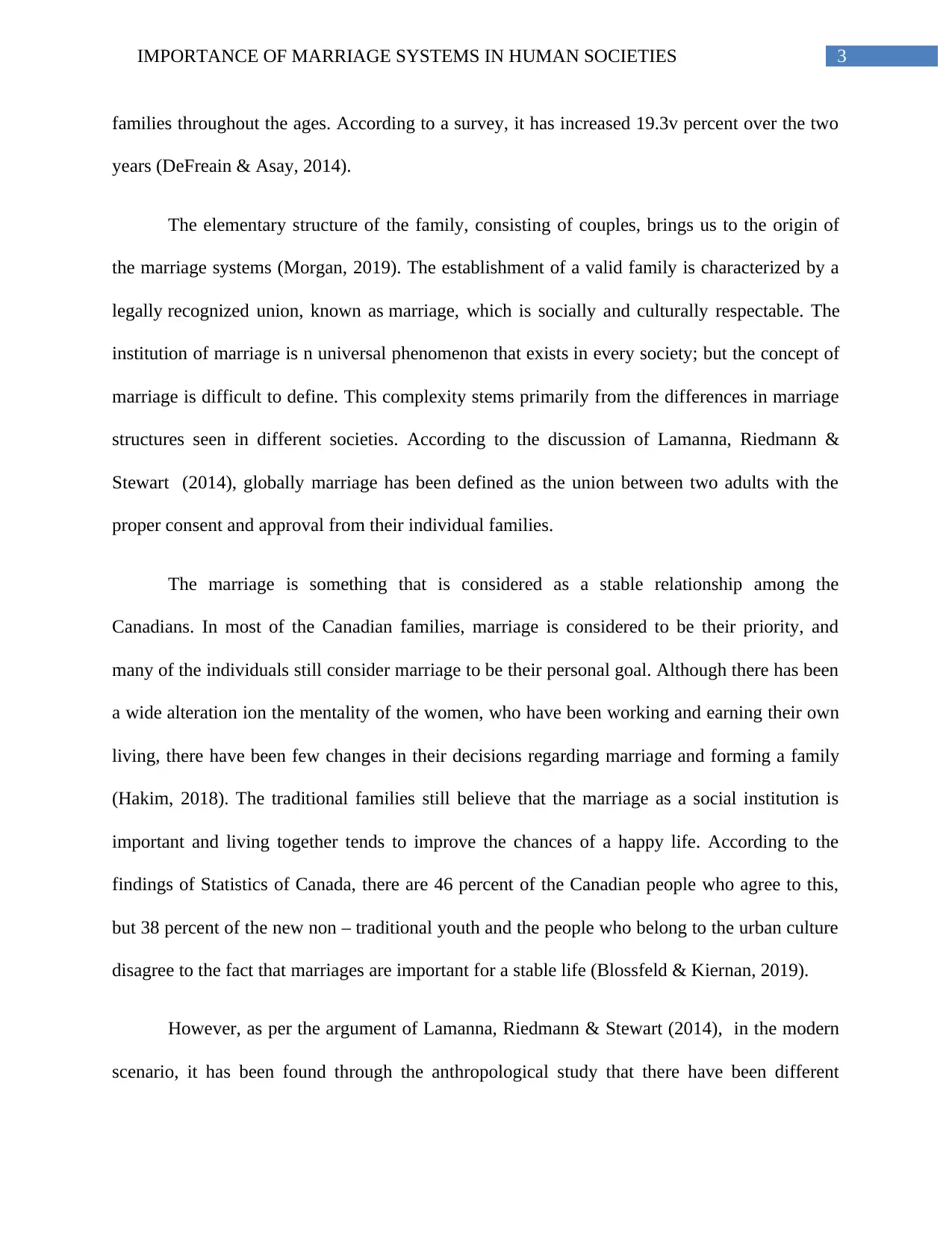
3IMPORTANCE OF MARRIAGE SYSTEMS IN HUMAN SOCIETIES
families throughout the ages. According to a survey, it has increased 19.3v percent over the two
years (DeFreain & Asay, 2014).
The elementary structure of the family, consisting of couples, brings us to the origin of
the marriage systems (Morgan, 2019). The establishment of a valid family is characterized by a
legally recognized union, known as marriage, which is socially and culturally respectable. The
institution of marriage is n universal phenomenon that exists in every society; but the concept of
marriage is difficult to define. This complexity stems primarily from the differences in marriage
structures seen in different societies. According to the discussion of Lamanna, Riedmann &
Stewart (2014), globally marriage has been defined as the union between two adults with the
proper consent and approval from their individual families.
The marriage is something that is considered as a stable relationship among the
Canadians. In most of the Canadian families, marriage is considered to be their priority, and
many of the individuals still consider marriage to be their personal goal. Although there has been
a wide alteration ion the mentality of the women, who have been working and earning their own
living, there have been few changes in their decisions regarding marriage and forming a family
(Hakim, 2018). The traditional families still believe that the marriage as a social institution is
important and living together tends to improve the chances of a happy life. According to the
findings of Statistics of Canada, there are 46 percent of the Canadian people who agree to this,
but 38 percent of the new non – traditional youth and the people who belong to the urban culture
disagree to the fact that marriages are important for a stable life (Blossfeld & Kiernan, 2019).
However, as per the argument of Lamanna, Riedmann & Stewart (2014), in the modern
scenario, it has been found through the anthropological study that there have been different
families throughout the ages. According to a survey, it has increased 19.3v percent over the two
years (DeFreain & Asay, 2014).
The elementary structure of the family, consisting of couples, brings us to the origin of
the marriage systems (Morgan, 2019). The establishment of a valid family is characterized by a
legally recognized union, known as marriage, which is socially and culturally respectable. The
institution of marriage is n universal phenomenon that exists in every society; but the concept of
marriage is difficult to define. This complexity stems primarily from the differences in marriage
structures seen in different societies. According to the discussion of Lamanna, Riedmann &
Stewart (2014), globally marriage has been defined as the union between two adults with the
proper consent and approval from their individual families.
The marriage is something that is considered as a stable relationship among the
Canadians. In most of the Canadian families, marriage is considered to be their priority, and
many of the individuals still consider marriage to be their personal goal. Although there has been
a wide alteration ion the mentality of the women, who have been working and earning their own
living, there have been few changes in their decisions regarding marriage and forming a family
(Hakim, 2018). The traditional families still believe that the marriage as a social institution is
important and living together tends to improve the chances of a happy life. According to the
findings of Statistics of Canada, there are 46 percent of the Canadian people who agree to this,
but 38 percent of the new non – traditional youth and the people who belong to the urban culture
disagree to the fact that marriages are important for a stable life (Blossfeld & Kiernan, 2019).
However, as per the argument of Lamanna, Riedmann & Stewart (2014), in the modern
scenario, it has been found through the anthropological study that there have been different
Paraphrase This Document
Need a fresh take? Get an instant paraphrase of this document with our AI Paraphraser
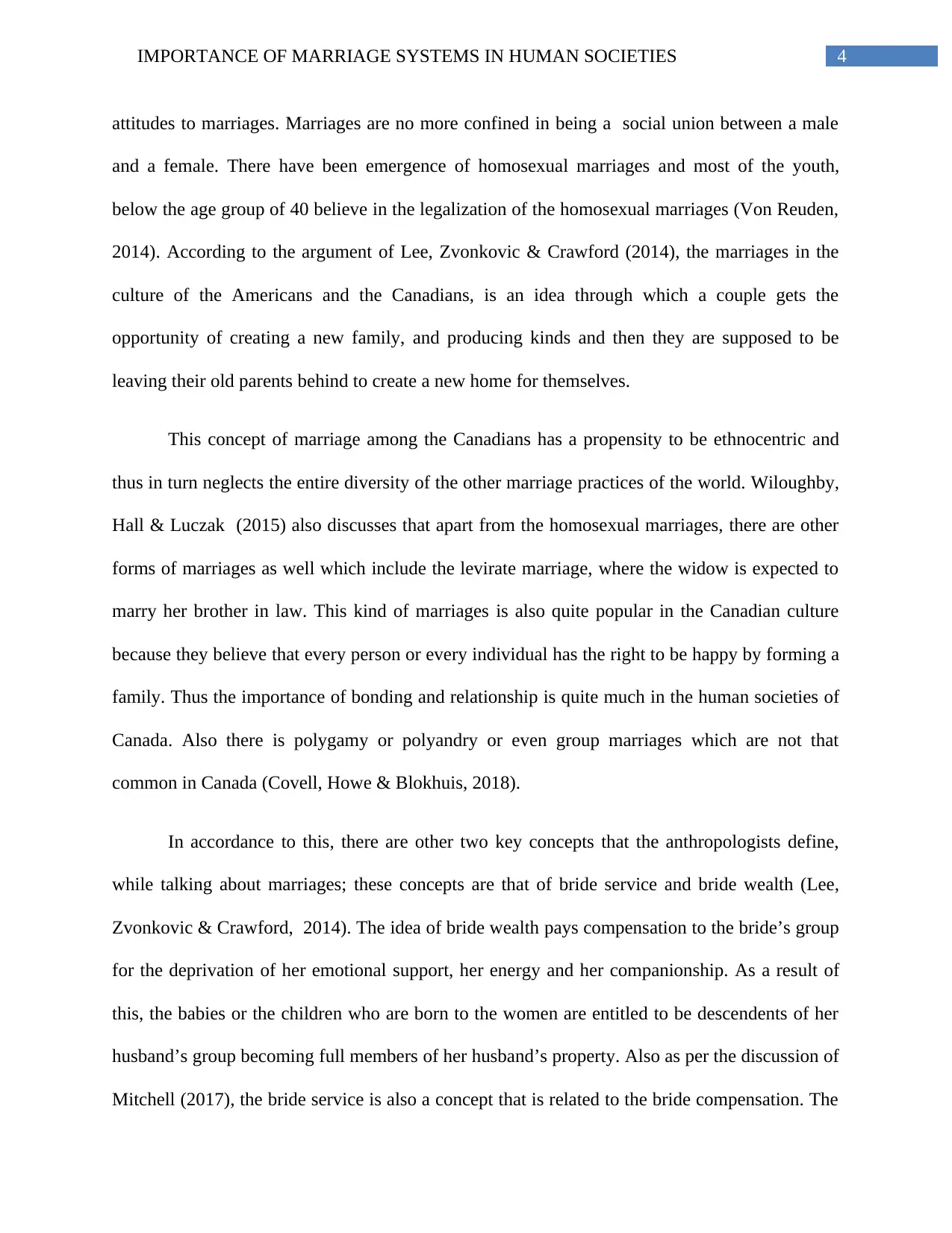
4IMPORTANCE OF MARRIAGE SYSTEMS IN HUMAN SOCIETIES
attitudes to marriages. Marriages are no more confined in being a social union between a male
and a female. There have been emergence of homosexual marriages and most of the youth,
below the age group of 40 believe in the legalization of the homosexual marriages (Von Reuden,
2014). According to the argument of Lee, Zvonkovic & Crawford (2014), the marriages in the
culture of the Americans and the Canadians, is an idea through which a couple gets the
opportunity of creating a new family, and producing kinds and then they are supposed to be
leaving their old parents behind to create a new home for themselves.
This concept of marriage among the Canadians has a propensity to be ethnocentric and
thus in turn neglects the entire diversity of the other marriage practices of the world. Wiloughby,
Hall & Luczak (2015) also discusses that apart from the homosexual marriages, there are other
forms of marriages as well which include the levirate marriage, where the widow is expected to
marry her brother in law. This kind of marriages is also quite popular in the Canadian culture
because they believe that every person or every individual has the right to be happy by forming a
family. Thus the importance of bonding and relationship is quite much in the human societies of
Canada. Also there is polygamy or polyandry or even group marriages which are not that
common in Canada (Covell, Howe & Blokhuis, 2018).
In accordance to this, there are other two key concepts that the anthropologists define,
while talking about marriages; these concepts are that of bride service and bride wealth (Lee,
Zvonkovic & Crawford, 2014). The idea of bride wealth pays compensation to the bride’s group
for the deprivation of her emotional support, her energy and her companionship. As a result of
this, the babies or the children who are born to the women are entitled to be descendents of her
husband’s group becoming full members of her husband’s property. Also as per the discussion of
Mitchell (2017), the bride service is also a concept that is related to the bride compensation. The
attitudes to marriages. Marriages are no more confined in being a social union between a male
and a female. There have been emergence of homosexual marriages and most of the youth,
below the age group of 40 believe in the legalization of the homosexual marriages (Von Reuden,
2014). According to the argument of Lee, Zvonkovic & Crawford (2014), the marriages in the
culture of the Americans and the Canadians, is an idea through which a couple gets the
opportunity of creating a new family, and producing kinds and then they are supposed to be
leaving their old parents behind to create a new home for themselves.
This concept of marriage among the Canadians has a propensity to be ethnocentric and
thus in turn neglects the entire diversity of the other marriage practices of the world. Wiloughby,
Hall & Luczak (2015) also discusses that apart from the homosexual marriages, there are other
forms of marriages as well which include the levirate marriage, where the widow is expected to
marry her brother in law. This kind of marriages is also quite popular in the Canadian culture
because they believe that every person or every individual has the right to be happy by forming a
family. Thus the importance of bonding and relationship is quite much in the human societies of
Canada. Also there is polygamy or polyandry or even group marriages which are not that
common in Canada (Covell, Howe & Blokhuis, 2018).
In accordance to this, there are other two key concepts that the anthropologists define,
while talking about marriages; these concepts are that of bride service and bride wealth (Lee,
Zvonkovic & Crawford, 2014). The idea of bride wealth pays compensation to the bride’s group
for the deprivation of her emotional support, her energy and her companionship. As a result of
this, the babies or the children who are born to the women are entitled to be descendents of her
husband’s group becoming full members of her husband’s property. Also as per the discussion of
Mitchell (2017), the bride service is also a concept that is related to the bride compensation. The
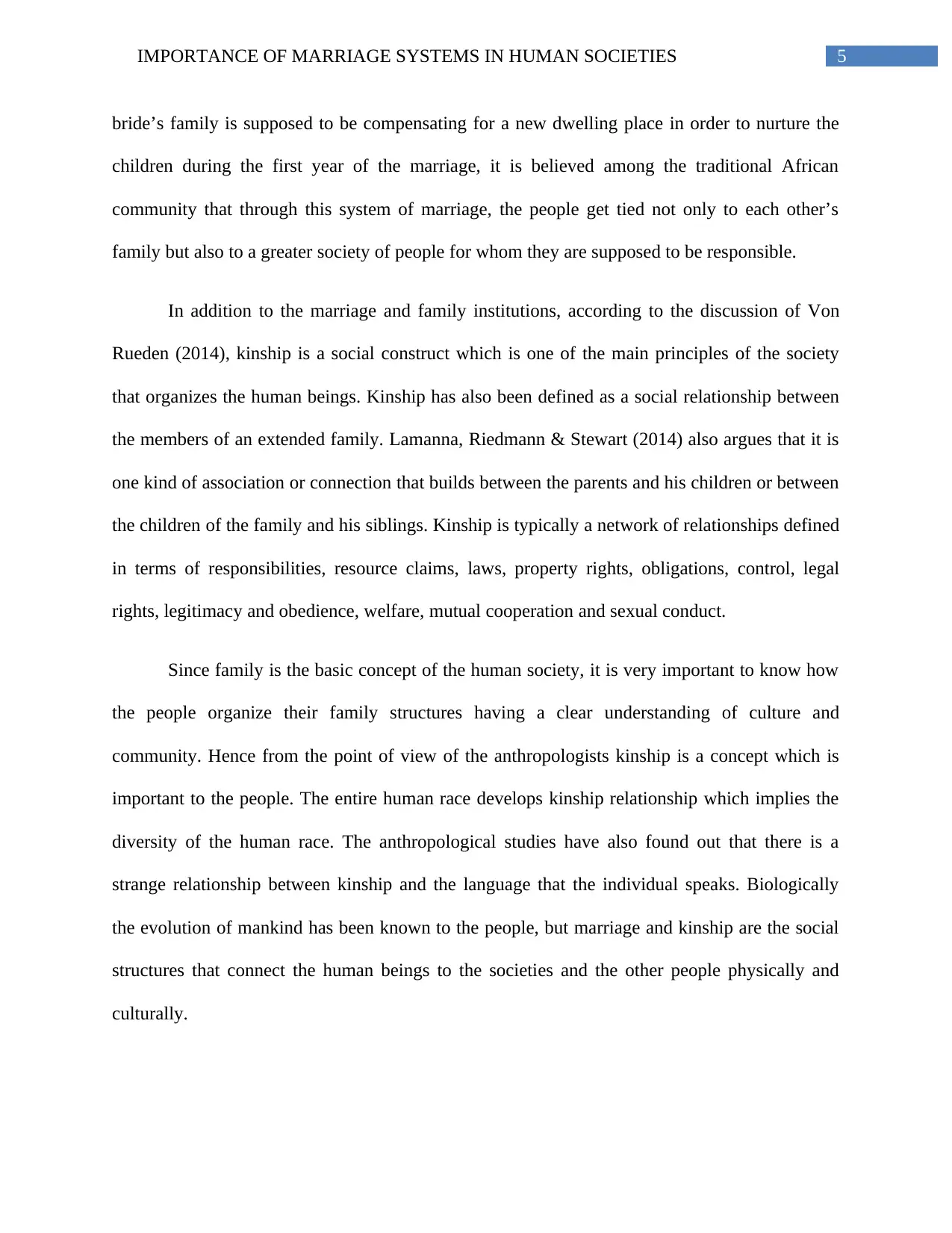
5IMPORTANCE OF MARRIAGE SYSTEMS IN HUMAN SOCIETIES
bride’s family is supposed to be compensating for a new dwelling place in order to nurture the
children during the first year of the marriage, it is believed among the traditional African
community that through this system of marriage, the people get tied not only to each other’s
family but also to a greater society of people for whom they are supposed to be responsible.
In addition to the marriage and family institutions, according to the discussion of Von
Rueden (2014), kinship is a social construct which is one of the main principles of the society
that organizes the human beings. Kinship has also been defined as a social relationship between
the members of an extended family. Lamanna, Riedmann & Stewart (2014) also argues that it is
one kind of association or connection that builds between the parents and his children or between
the children of the family and his siblings. Kinship is typically a network of relationships defined
in terms of responsibilities, resource claims, laws, property rights, obligations, control, legal
rights, legitimacy and obedience, welfare, mutual cooperation and sexual conduct.
Since family is the basic concept of the human society, it is very important to know how
the people organize their family structures having a clear understanding of culture and
community. Hence from the point of view of the anthropologists kinship is a concept which is
important to the people. The entire human race develops kinship relationship which implies the
diversity of the human race. The anthropological studies have also found out that there is a
strange relationship between kinship and the language that the individual speaks. Biologically
the evolution of mankind has been known to the people, but marriage and kinship are the social
structures that connect the human beings to the societies and the other people physically and
culturally.
bride’s family is supposed to be compensating for a new dwelling place in order to nurture the
children during the first year of the marriage, it is believed among the traditional African
community that through this system of marriage, the people get tied not only to each other’s
family but also to a greater society of people for whom they are supposed to be responsible.
In addition to the marriage and family institutions, according to the discussion of Von
Rueden (2014), kinship is a social construct which is one of the main principles of the society
that organizes the human beings. Kinship has also been defined as a social relationship between
the members of an extended family. Lamanna, Riedmann & Stewart (2014) also argues that it is
one kind of association or connection that builds between the parents and his children or between
the children of the family and his siblings. Kinship is typically a network of relationships defined
in terms of responsibilities, resource claims, laws, property rights, obligations, control, legal
rights, legitimacy and obedience, welfare, mutual cooperation and sexual conduct.
Since family is the basic concept of the human society, it is very important to know how
the people organize their family structures having a clear understanding of culture and
community. Hence from the point of view of the anthropologists kinship is a concept which is
important to the people. The entire human race develops kinship relationship which implies the
diversity of the human race. The anthropological studies have also found out that there is a
strange relationship between kinship and the language that the individual speaks. Biologically
the evolution of mankind has been known to the people, but marriage and kinship are the social
structures that connect the human beings to the societies and the other people physically and
culturally.
⊘ This is a preview!⊘
Do you want full access?
Subscribe today to unlock all pages.

Trusted by 1+ million students worldwide
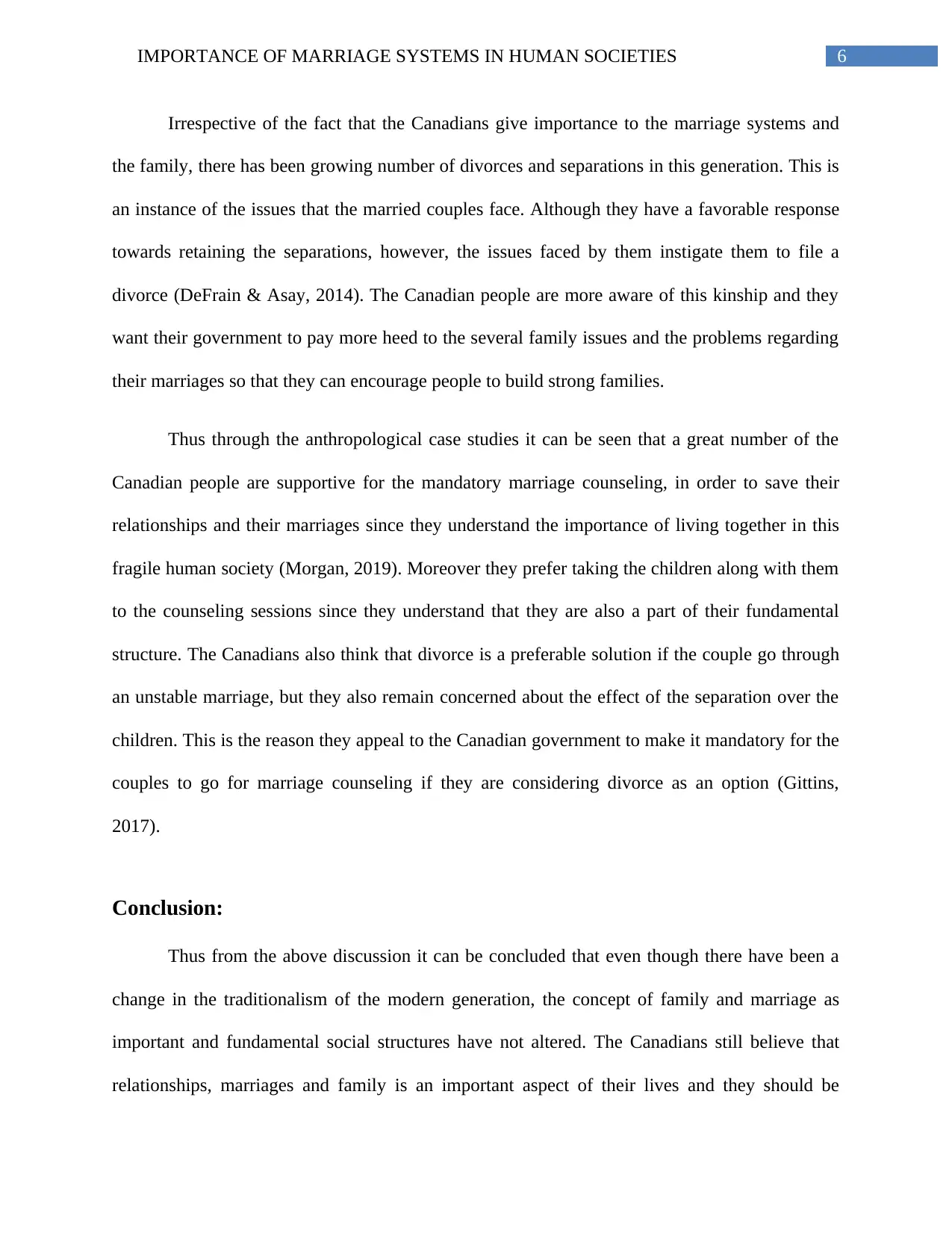
6IMPORTANCE OF MARRIAGE SYSTEMS IN HUMAN SOCIETIES
Irrespective of the fact that the Canadians give importance to the marriage systems and
the family, there has been growing number of divorces and separations in this generation. This is
an instance of the issues that the married couples face. Although they have a favorable response
towards retaining the separations, however, the issues faced by them instigate them to file a
divorce (DeFrain & Asay, 2014). The Canadian people are more aware of this kinship and they
want their government to pay more heed to the several family issues and the problems regarding
their marriages so that they can encourage people to build strong families.
Thus through the anthropological case studies it can be seen that a great number of the
Canadian people are supportive for the mandatory marriage counseling, in order to save their
relationships and their marriages since they understand the importance of living together in this
fragile human society (Morgan, 2019). Moreover they prefer taking the children along with them
to the counseling sessions since they understand that they are also a part of their fundamental
structure. The Canadians also think that divorce is a preferable solution if the couple go through
an unstable marriage, but they also remain concerned about the effect of the separation over the
children. This is the reason they appeal to the Canadian government to make it mandatory for the
couples to go for marriage counseling if they are considering divorce as an option (Gittins,
2017).
Conclusion:
Thus from the above discussion it can be concluded that even though there have been a
change in the traditionalism of the modern generation, the concept of family and marriage as
important and fundamental social structures have not altered. The Canadians still believe that
relationships, marriages and family is an important aspect of their lives and they should be
Irrespective of the fact that the Canadians give importance to the marriage systems and
the family, there has been growing number of divorces and separations in this generation. This is
an instance of the issues that the married couples face. Although they have a favorable response
towards retaining the separations, however, the issues faced by them instigate them to file a
divorce (DeFrain & Asay, 2014). The Canadian people are more aware of this kinship and they
want their government to pay more heed to the several family issues and the problems regarding
their marriages so that they can encourage people to build strong families.
Thus through the anthropological case studies it can be seen that a great number of the
Canadian people are supportive for the mandatory marriage counseling, in order to save their
relationships and their marriages since they understand the importance of living together in this
fragile human society (Morgan, 2019). Moreover they prefer taking the children along with them
to the counseling sessions since they understand that they are also a part of their fundamental
structure. The Canadians also think that divorce is a preferable solution if the couple go through
an unstable marriage, but they also remain concerned about the effect of the separation over the
children. This is the reason they appeal to the Canadian government to make it mandatory for the
couples to go for marriage counseling if they are considering divorce as an option (Gittins,
2017).
Conclusion:
Thus from the above discussion it can be concluded that even though there have been a
change in the traditionalism of the modern generation, the concept of family and marriage as
important and fundamental social structures have not altered. The Canadians still believe that
relationships, marriages and family is an important aspect of their lives and they should be
Paraphrase This Document
Need a fresh take? Get an instant paraphrase of this document with our AI Paraphraser
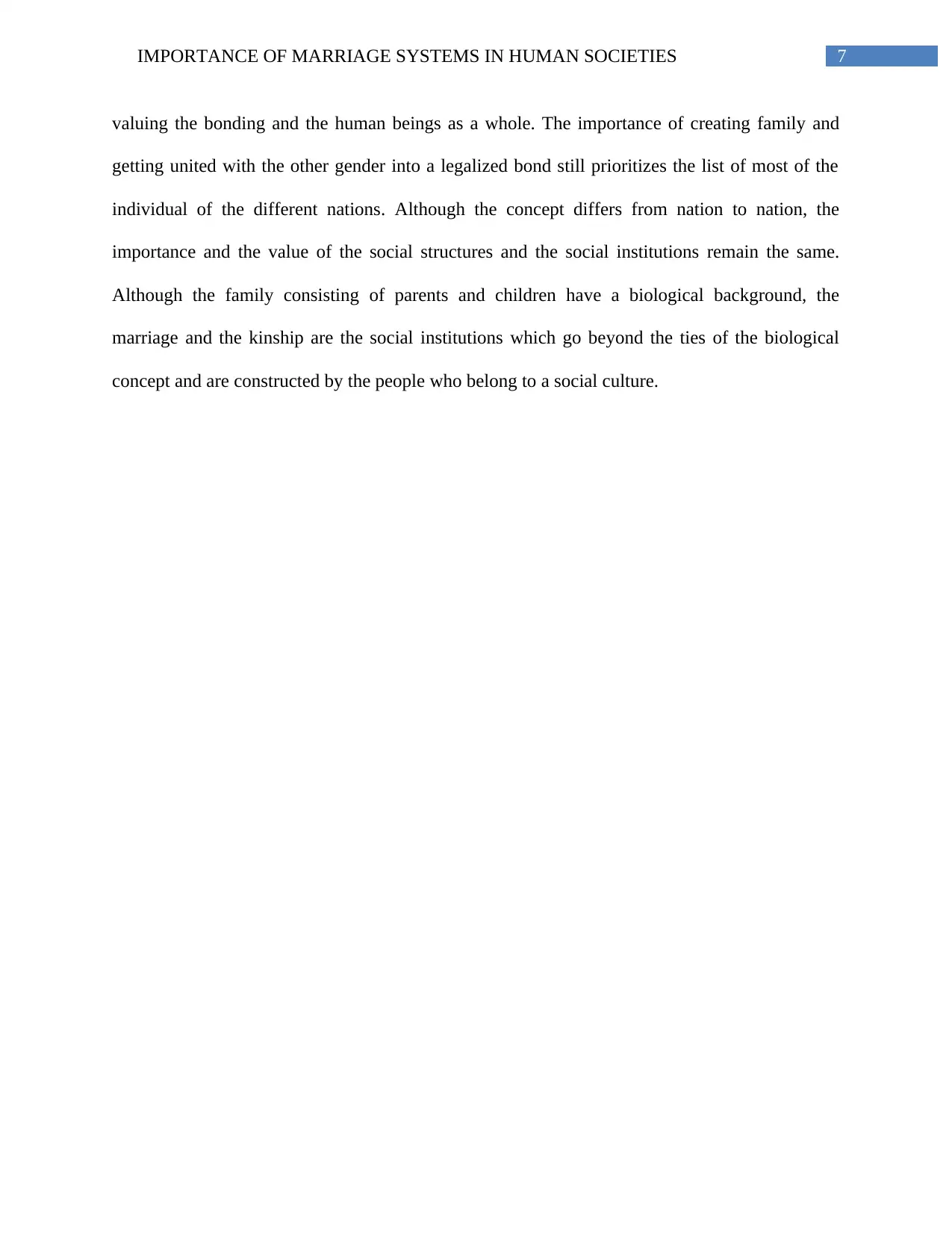
7IMPORTANCE OF MARRIAGE SYSTEMS IN HUMAN SOCIETIES
valuing the bonding and the human beings as a whole. The importance of creating family and
getting united with the other gender into a legalized bond still prioritizes the list of most of the
individual of the different nations. Although the concept differs from nation to nation, the
importance and the value of the social structures and the social institutions remain the same.
Although the family consisting of parents and children have a biological background, the
marriage and the kinship are the social institutions which go beyond the ties of the biological
concept and are constructed by the people who belong to a social culture.
valuing the bonding and the human beings as a whole. The importance of creating family and
getting united with the other gender into a legalized bond still prioritizes the list of most of the
individual of the different nations. Although the concept differs from nation to nation, the
importance and the value of the social structures and the social institutions remain the same.
Although the family consisting of parents and children have a biological background, the
marriage and the kinship are the social institutions which go beyond the ties of the biological
concept and are constructed by the people who belong to a social culture.
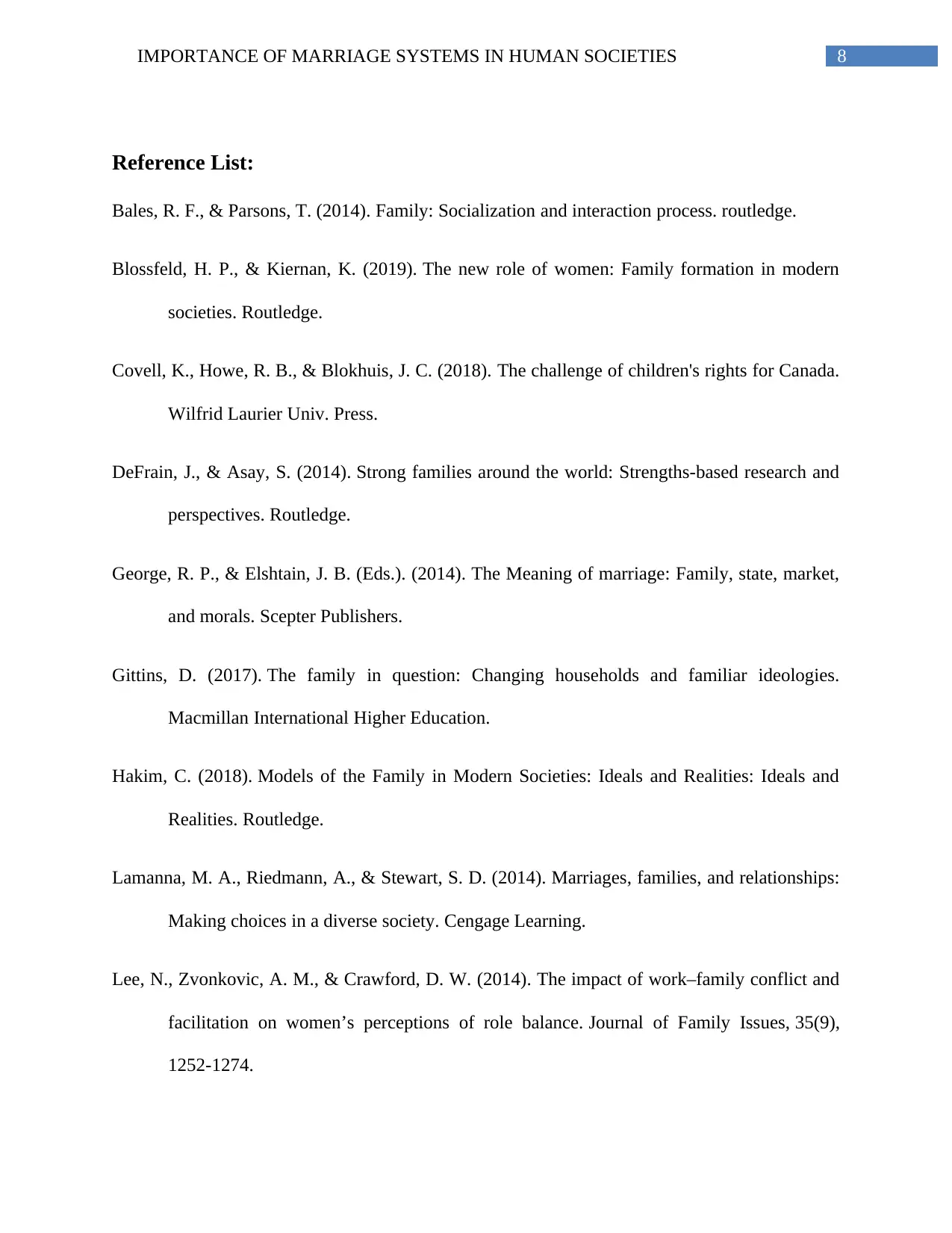
8IMPORTANCE OF MARRIAGE SYSTEMS IN HUMAN SOCIETIES
Reference List:
Bales, R. F., & Parsons, T. (2014). Family: Socialization and interaction process. routledge.
Blossfeld, H. P., & Kiernan, K. (2019). The new role of women: Family formation in modern
societies. Routledge.
Covell, K., Howe, R. B., & Blokhuis, J. C. (2018). The challenge of children's rights for Canada.
Wilfrid Laurier Univ. Press.
DeFrain, J., & Asay, S. (2014). Strong families around the world: Strengths-based research and
perspectives. Routledge.
George, R. P., & Elshtain, J. B. (Eds.). (2014). The Meaning of marriage: Family, state, market,
and morals. Scepter Publishers.
Gittins, D. (2017). The family in question: Changing households and familiar ideologies.
Macmillan International Higher Education.
Hakim, C. (2018). Models of the Family in Modern Societies: Ideals and Realities: Ideals and
Realities. Routledge.
Lamanna, M. A., Riedmann, A., & Stewart, S. D. (2014). Marriages, families, and relationships:
Making choices in a diverse society. Cengage Learning.
Lee, N., Zvonkovic, A. M., & Crawford, D. W. (2014). The impact of work–family conflict and
facilitation on women’s perceptions of role balance. Journal of Family Issues, 35(9),
1252-1274.
Reference List:
Bales, R. F., & Parsons, T. (2014). Family: Socialization and interaction process. routledge.
Blossfeld, H. P., & Kiernan, K. (2019). The new role of women: Family formation in modern
societies. Routledge.
Covell, K., Howe, R. B., & Blokhuis, J. C. (2018). The challenge of children's rights for Canada.
Wilfrid Laurier Univ. Press.
DeFrain, J., & Asay, S. (2014). Strong families around the world: Strengths-based research and
perspectives. Routledge.
George, R. P., & Elshtain, J. B. (Eds.). (2014). The Meaning of marriage: Family, state, market,
and morals. Scepter Publishers.
Gittins, D. (2017). The family in question: Changing households and familiar ideologies.
Macmillan International Higher Education.
Hakim, C. (2018). Models of the Family in Modern Societies: Ideals and Realities: Ideals and
Realities. Routledge.
Lamanna, M. A., Riedmann, A., & Stewart, S. D. (2014). Marriages, families, and relationships:
Making choices in a diverse society. Cengage Learning.
Lee, N., Zvonkovic, A. M., & Crawford, D. W. (2014). The impact of work–family conflict and
facilitation on women’s perceptions of role balance. Journal of Family Issues, 35(9),
1252-1274.
⊘ This is a preview!⊘
Do you want full access?
Subscribe today to unlock all pages.

Trusted by 1+ million students worldwide
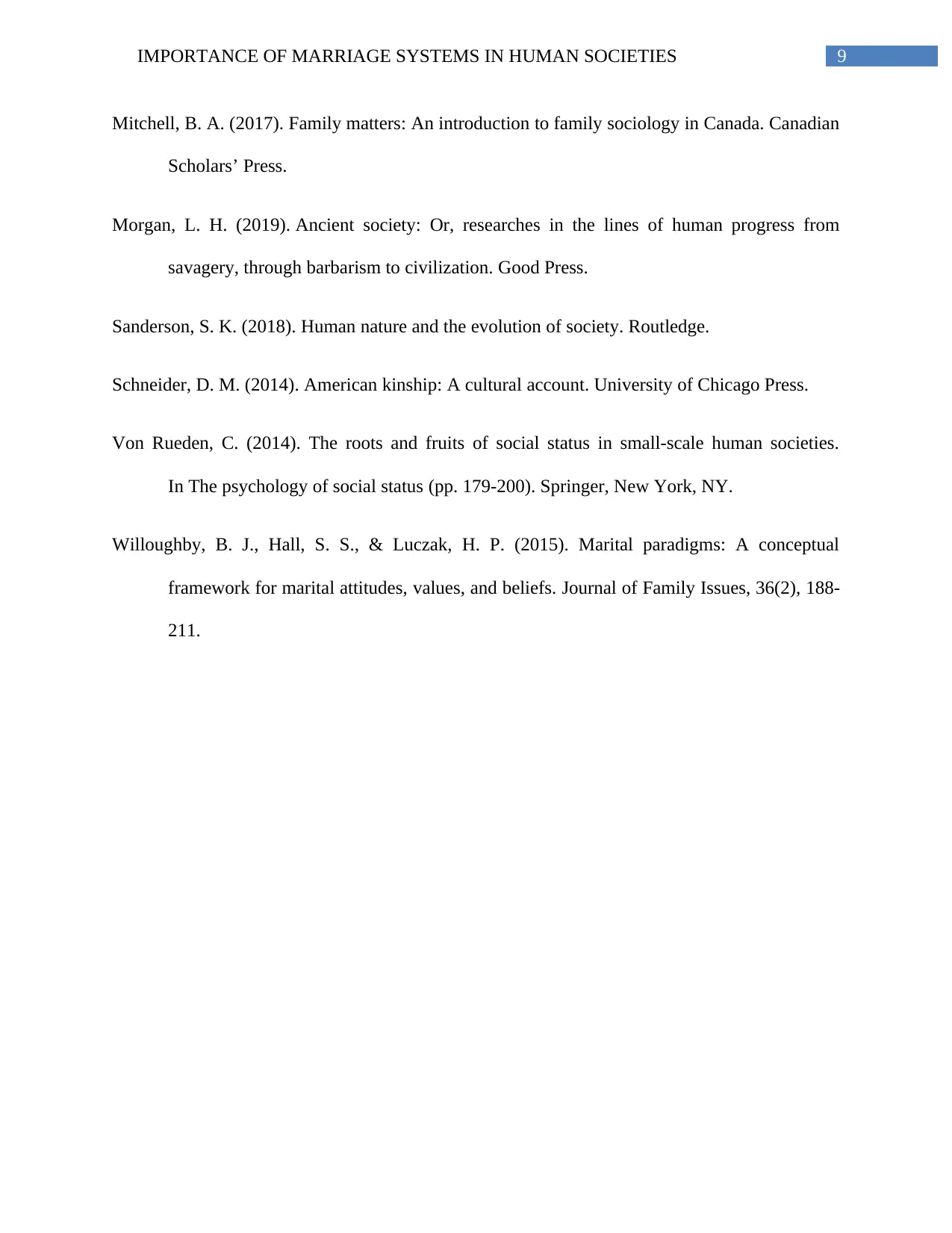
9IMPORTANCE OF MARRIAGE SYSTEMS IN HUMAN SOCIETIES
Mitchell, B. A. (2017). Family matters: An introduction to family sociology in Canada. Canadian
Scholars’ Press.
Morgan, L. H. (2019). Ancient society: Or, researches in the lines of human progress from
savagery, through barbarism to civilization. Good Press.
Sanderson, S. K. (2018). Human nature and the evolution of society. Routledge.
Schneider, D. M. (2014). American kinship: A cultural account. University of Chicago Press.
Von Rueden, C. (2014). The roots and fruits of social status in small-scale human societies.
In The psychology of social status (pp. 179-200). Springer, New York, NY.
Willoughby, B. J., Hall, S. S., & Luczak, H. P. (2015). Marital paradigms: A conceptual
framework for marital attitudes, values, and beliefs. Journal of Family Issues, 36(2), 188-
211.
Mitchell, B. A. (2017). Family matters: An introduction to family sociology in Canada. Canadian
Scholars’ Press.
Morgan, L. H. (2019). Ancient society: Or, researches in the lines of human progress from
savagery, through barbarism to civilization. Good Press.
Sanderson, S. K. (2018). Human nature and the evolution of society. Routledge.
Schneider, D. M. (2014). American kinship: A cultural account. University of Chicago Press.
Von Rueden, C. (2014). The roots and fruits of social status in small-scale human societies.
In The psychology of social status (pp. 179-200). Springer, New York, NY.
Willoughby, B. J., Hall, S. S., & Luczak, H. P. (2015). Marital paradigms: A conceptual
framework for marital attitudes, values, and beliefs. Journal of Family Issues, 36(2), 188-
211.
1 out of 10
Related Documents
Your All-in-One AI-Powered Toolkit for Academic Success.
+13062052269
info@desklib.com
Available 24*7 on WhatsApp / Email
![[object Object]](/_next/static/media/star-bottom.7253800d.svg)
Unlock your academic potential
Copyright © 2020–2025 A2Z Services. All Rights Reserved. Developed and managed by ZUCOL.





